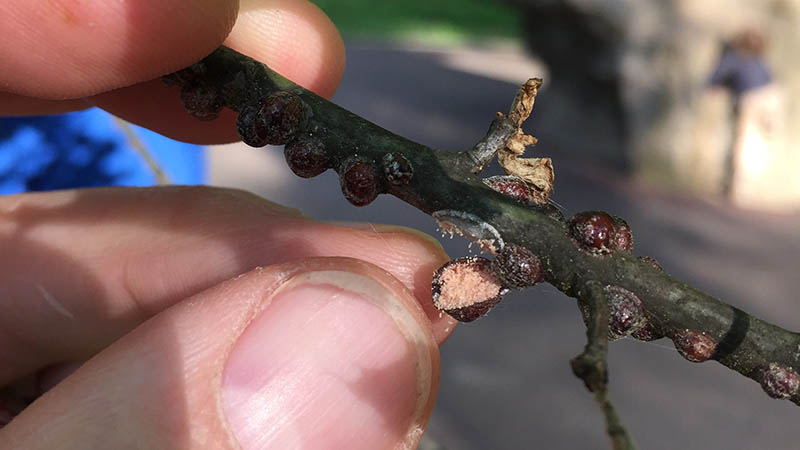Lecanium Scales Full of Eggs
go.ncsu.edu/readext?680651
en Español / em Português
El inglés es el idioma de control de esta página. En la medida en que haya algún conflicto entre la traducción al inglés y la traducción, el inglés prevalece.
Al hacer clic en el enlace de traducción se activa un servicio de traducción gratuito para convertir la página al español. Al igual que con cualquier traducción por Internet, la conversión no es sensible al contexto y puede que no traduzca el texto en su significado original. NC State Extension no garantiza la exactitud del texto traducido. Por favor, tenga en cuenta que algunas aplicaciones y/o servicios pueden no funcionar como se espera cuando se traducen.
Português
Inglês é o idioma de controle desta página. Na medida que haja algum conflito entre o texto original em Inglês e a tradução, o Inglês prevalece.
Ao clicar no link de tradução, um serviço gratuito de tradução será ativado para converter a página para o Português. Como em qualquer tradução pela internet, a conversão não é sensivel ao contexto e pode não ocorrer a tradução para o significado orginal. O serviço de Extensão da Carolina do Norte (NC State Extension) não garante a exatidão do texto traduzido. Por favor, observe que algumas funções ou serviços podem não funcionar como esperado após a tradução.
English
English is the controlling language of this page. To the extent there is any conflict between the English text and the translation, English controls.
Clicking on the translation link activates a free translation service to convert the page to Spanish. As with any Internet translation, the conversion is not context-sensitive and may not translate the text to its original meaning. NC State Extension does not guarantee the accuracy of the translated text. Please note that some applications and/or services may not function as expected when translated.
Collapse ▲Oak lecanium scale and European fruit lecanium are nearly identical soft scales that infest oaks and many other tree species including redbud, dogwood, maple, fruit trees, and others. In spring adults swell to large (for scales) hemispherical egg cases with thousands of eggs. This is the stage you will see now on infested twigs. The eggs will hatch in a couple weeks and nymphs will crawl out to branches to feed all summer. Egg hatch is a good time to target scales with low toxicity products like horticultural oil and insecticidal soap. We have also had success reducing the abundance of nymphs during summer with horticultural oil. Other products such as systemic neonicotinoids and insect growth regulators are also available for scale management. Trees surrounded by impervious surfaces are most susceptible to scales due to water stress and high temperatures.



